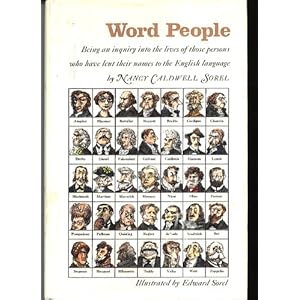Not long ago I had an embarrassing moment. I discovered that the word erstwhile means former. You
may think: well, he's easily embarrassed if that bothers him. The
problem is that I had managed to get to the age of mumbly-mumble
thinking it meant alleged.
In one of my stories about Leopold Longshanks, a mystery writer, I said:
Discovering
he was using a word he couldn’t define annoyed him, like a carpenter opening
his tool box and finding a gadget he didn’t recognize.
 Exactly.
I agree with myself completely. I wondered if anyone else had the same
experience so I asked my Facebook friends, and got an earful. Here are
some of their examples of words that fooled them.
Exactly.
I agree with myself completely. I wondered if anyone else had the same
experience so I asked my Facebook friends, and got an earful. Here are
some of their examples of words that fooled them.
Toothsome means delicious not
toothy.
Nauseous does not mean nauseated.
I used to use venal to
mean generally nasty or snide, when it really means to commit crime for money.
For years I thought svelte meant the opposite of what it really means.
Livid? I always thought it meant flushed red, but it means pale.
Livid? I always thought it meant flushed red, but it means pale.
Querulous means whiny. I
always thought it was about being picky, or a fuddy-duddy.
Enervate. Thought it was kin to
energize.
I used to think hoi
polloi meant the snooty upper crust. Then I learned some Greek...
How the heck can flammable and inflammable mean the same thing?
I used to have a boss that referred to a very crowded space as fulsome. It means over-the-top flattery. When she referred to a fulsome audience I winced.
Georgette Heyer, in Black Sheep, uses sallow and swarthy interchangeably several times to describe the leading man's
complexion (which was swarthy, not sallow).
I tend to mix up chartreuse and puce.
Rather than saying self-deprecating, I'd been using self-depreciating for years.
dearth
secular
sanguine
obviate
Although I knew what it meant I
always read hyperbole as hyper bowl and couldn't figure out what that meant.
I was an adult
before I realized pinochle was pee-nuckle - a card game
I used to play with my father - and not some unknown card game pronounced. pin-o-ch-lee.
I was in college before an English teacher told me that AP-ruh-PO and apropos were the same word.
Rob again now: While I was writing this I got an email from someone who said he was "vehemently in favor of" something or other. I didn't know that was possible. I knew vehement meant forceful, emphatic, but I thought it was inherently negative. I regret my erstwhile (ha!) misunderstanding.
So, confession is good for the soul. What words have you misunderstood all your life?
I was in college before an English teacher told me that AP-ruh-PO and apropos were the same word.
Rob again now: While I was writing this I got an email from someone who said he was "vehemently in favor of" something or other. I didn't know that was possible. I knew vehement meant forceful, emphatic, but I thought it was inherently negative. I regret my erstwhile (ha!) misunderstanding.
So, confession is good for the soul. What words have you misunderstood all your life?












